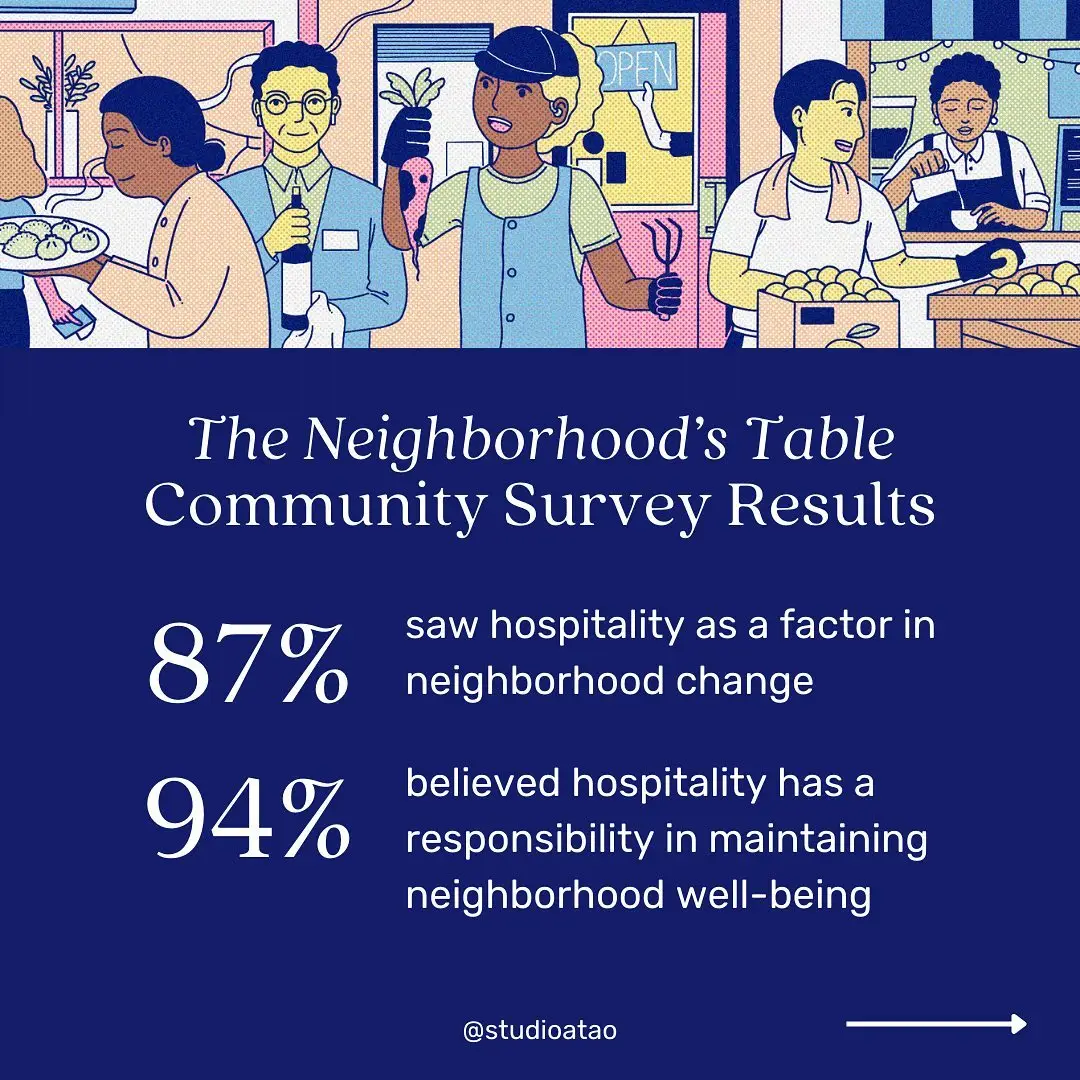Restaurant Forward
Intentional Hospitality in a Gentrifying World with Studio ATAO
November 21, 2022
How restaurants can be part of the solution in disinvested communities.
Restaurant Forward profiles the technology, trends and people changing the face of hospitality. Have a trend or industry expert you’d like to see featured? Send suggestions to RestaurantForward@getbento.com.
For most of the last century, the United States has been urbanizing. In 2022, 83% of Americans live in cities — up from 68% in 1950 — and the UN predicts that by 2050, that number will be 90%. Historically, this growth has been good for the restaurant industry: bigger cities means more potential customers, a lower cost of goods and abundant workforces for the restaurants in those cities.
But urbanization has a downside. Gentrification — the term for when relatively wealthy people move into disinvested neighborhoods, displacing the neighborhood’s residents and businesses — has been a major problem in nearly every American city over the last generation.
“Since 2000, nearly 20% of neighborhoods with lower incomes and home values have experienced an influx of wealth and capital,” reads the introduction to The Neighborhood’s Table, a document released in November 2022 by the food-industry nonprofit Studio ATAO. “Neighborhoods that historically suffered from lack of investment are now reckoning with what feels like the choice between improved community infrastructure and resources, at the cost of displacing long-term residents.”
Restaurants and other hospitality businesses play an important role in gentrification. Menu prices, music, décor and the demographics of the staff all send signals that tell the neighborhood who is welcome there and who is not. The impact of a new restaurant can be positive or negative depending on how its owners handle some of these key, often difficult questions.
With the publication of The Neighborhood’s Table, Studio ATAO has set out to make sure restaurants opening in gentrifying neighborhoods have all the tools they need to do so in a responsible, community-minded manner. The organization, founded and led by Chef Jenny Dorsey, is a combination think tank, advocacy group and educational resource promoting social justice in the food, beverage and hospitality industry.
To learn more about the change the organization hopes to see come from their document, we spoke with Edric Huang, Studio ATAO’s Head of Research, who served as lead researcher and one of the primary authors of The Neighborhood’s Table.
BentoBox: To start us off, can you explain what this document is and what it hopes to achieve?
Huang: The Neighborhood’s Table is a toolkit we wrote to give hospitality business owners some concrete things they can commit to before, during and after they open for business in a gentrifying neighborhood. These include action items and questions like, “How do I engage the community? How am I going to serve guests? What questions should I include in that neighborhood survey? Where should I go to meet people?” They’re some of the considerations operators might be asking before they open. The goal is to communicate, within the economic realities we have, “How can I not be a gentrifying restaurant but instead engage the community and invest in the people I’m opening a business around?”
Where did you source the action items from? Is this the result of in-person research or data analysis or both?
A lot of research over the last year and a half: conversations, interviews, surveys and other qualitative research that we used to produce an actionable document.
We started by interviewing at least 40 or 50 individuals in LA and New York, specifically in South LA and the Bushwick/Ridgewood area of New York. We talked to organizers, tenant unions and professors of urban planning. We talked to business owners who have done something about it and ones who hadn’t, just to get the full range of perspective, in about 8 to 10 focus groups over the course of about 4 months.
We also did a set of focus groups with media professionals; part of the toolkit is focused on food media and their responsibility in terms of building accountability into this process. Finally, we had conversations with developers and landlords in LA, through a partnership with the Urban Land Institute, and asked them what they, as responsible developers, do to make sure business owners know what power they have in these conversations — mostly during the period before signing the lease.

View Studio ATAO's Instagram here.
From these conversations, what role did you conclude restaurants play in gentrification?
Restaurants are often used as symbols of gentrification, or evidence that it is happening in a given neighborhood. If you think about descriptions of Brooklyn's Williamsburg or Greenpoint, for example, the manifestation of gentrification is often these hipster bars that have popped up over the last generation.
But it’s important to recognize that gentrification is a system and the result of a lot of interrelated forces. If we try to put the blame for gentrification on a specific kind of person or body, we are distracting ourselves from the real issue, which is that we're all implicated. So I think hospitality has gotten a bad rap in these situations.
A lot of people feel restaurants cause gentrification when, really, they’re more likely the first symptoms of it. And yes, developers sometimes use bars and restaurants to signal to other people who are not living in a neighborhood, “This is a place for you.” So while I don’t think these businesses are causing gentrification, necessarily — they’re almost never big enough — they do play an outsized role in contributing to the recognition that gentrification is happening.
Our approach is centered around community investment: Building that web of relationships with people in the community and making your business part of something larger than just your profits.
How did this research change your personal understanding of gentrification?
Well, I studied gentrification a bit in college, so I came to this project with a certain awareness of historical and social forces that influence gentrification. I came in believing that, you know, everyone is implicated and there are things we all need to be doing to address the issue.
But this project showed me there really are ways to write a budget that accounts for social investment and social value beyond just saying, “Oh, it’s impossible,” or “The profit margins are too tight.” There is a way to do this, and people are doing it.
A lot of what I focused on prior to this project was policy and generally a focus on big forces. But these conversations showed me the impact small, business-level decisions can make. It was really helpful to focus on businesses and recognize the very real power individual owners have when they’re opening up a new restaurant.
Studio ATAO is a 501(c)3 nonprofit defining more equitable standards for the food, beverage, and hospitality industry. To learn more about the organization, visit them at studioatao.org and follow them on Instagram and TikTok. To download The Neighborhood’s Table toolkit now, click here and access the document for free.
Recommended

Restaurant Forward
Building Healthy Habits in the Kitchen with Michael Chernow
November 10, 2022
The restaurateur behind NYC’s Meatball Shop and Seamore’s on why more chefs are taking their health seriously, and how you can do the same.

Restaurant Forward
The Next Phase of Food Tech with Kristen Hawley
October 5, 2022
Restaurant technology’s favorite beat writer discusses the relaunch of Expedite, what’s coming for restaurants, and the biggest story of her career.

Restaurant Forward
Closing the Racial and Gender Wealth Gap with Roots Chicken Shak
September 7, 2022
How a Texas fast-casual brand is reimagining the franchise model as a revolutionary (and profitable) form of social entrepreneurship.

